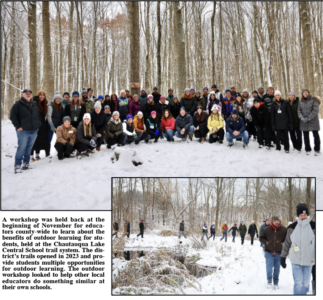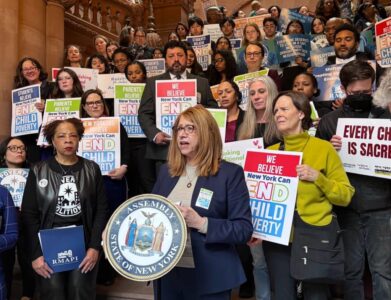Lawmaker Proposes Delay In EV Sales Targets

Assemblyman John McDomald, D-Albany, is pictured at a recent news conference during Earth Week.
An Albany-area Democrat is proposing the state postpone its looming requirement that 35% of vehicle sales be zero emission vehicles by 2026.
Assemblyman John McDonald recently introduced legislation (A.8524) that would postpone the implementation and enforcement of the state’s ACC II regulations until Jan. 1, 2028. The zero emissions sales are supposed to include all new cars by 2035.
“While the sponsor shares the goal of reducing emissions, these targets are misaligned with current consumer demand,” McDonald wrote in his legislative justification. “In 2024, fewer than 10% of new vehicle sales in New York were ZEVs. Expecting a 300% year-over-year increase to meet the 2026 benchmark is unrealistic, especially as federal support for EV adoption weakens. The current administration has signaled intentions to scale back federal funding for EV charging infrastructure and revise or roll back the $7,500 federal EV tax credit. These changes will reduce affordability and limit the incentives necessary to drive consumer adoption, making compliance with ACC II even more difficult and burdensome for consumers.”
McDonald’s bill comes after both the U.S. House of Representatives voted to block California from enforcing the phase-out of new gas-powered cars by 2035. The move comes a day after the chamber voted to halt California standards to cut tailpipe emissions from medium- and heavy-duty vehicles, as well as curb smog-forming nitrogen oxide pollution from trucks.
California for decades has been given the authority to adopt vehicle emissions standards that are stricter than the federal government’s. Democratic Gov. Gavin Newsom in 2020 announced plans to ban the sale of all new gas-powered vehicles in the state by 2035, as part of an aggressive effort to lower emissions from the transportation sector. Plug-in hybrids and used gas cars could still be sold. New York was among the states that quickly followed suit. Around a dozen states have already followed California’s lead.
Both the House and Senate Parliamentarian in April reaffirmed the GAO’s findings that California’s Clean Air Act waivers are not subject to the Congressional Review Act, according to California Sen. Adam Schiff’s office.
The U.S. Senate will move this week to block California from enforcing a series of vehicle emissions standards that are tougher than the federal government’s, including first-in-the-nation rules phasing out the sale of new gas-powered cars by 2035. Majority Leader John Thune, R-S.D., said Tuesday that the Senate will begin to consider three House-passed resolutions that would roll back the standards. Final votes could come as soon as this week. His announcement came despite significant pushback from Democrats, questions from some Republicans and the advice of the Senate Parliamentarian, who has sided with the U.S. Government Accountability Office in saying California’s policies are not subject to the review mechanism used by the House.
Federal uncertainty isn’t the only issue McDonald is raising. Limiting the supply of gas-powered cars could drive up the cost, sending those who want gas-powered vehicles out of state to buy them and decreasing tax revenues for state and local governments. Drivers could also choose to keep older, less efficient vehicles on the road longer, leading to more emissions. Charging stations are also sparse in rural areas, and not enough charging stations are being build to support the state’s electric vehicle goals even if consumers wanted to purchase electric vehicles.
“These unintended economic repercussions further reinforce the need for a thoughtful and phased approach to
Implementation,” McDonald wrote. “A temporary pause will allow for more infrastructure development, stabilization of the EV market, and reassessment of consumer affordability. With a more practical approach, New York can still lead on climate goals while ensuring fairness, accessibility, and long-term success. This pause is not a
retreat from environmental responsibility, but a recalibration to ensure long-term success in our transition to cleaner transportation.”




